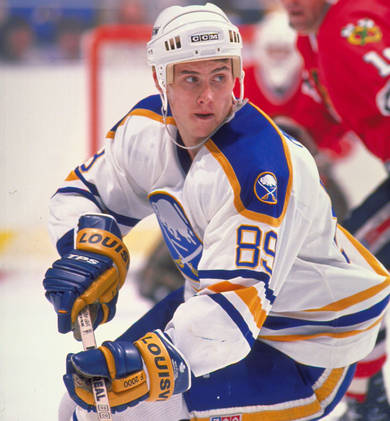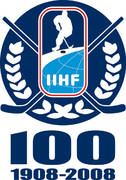

Story #63 Alexander Mogilny becomes the first Soviet NHL-defectorMay 2, 1989 – Stockholm, Sweden
In the spring of 1989, the Soviet Union had just won its 21st World Championship title at Stockholm’s new and beautiful Globen Arena. Coach Viktor Tikhonov was happy. His team had swept through the tournament with nine straight wins, just like the good old days. Tikhonov knew that his rebellious fabulous-five unit of Vyacheslav Fetisov, Alexei Kasatonov, Igor Larionov, Sergei Makarov and Vladimir Krutov would soon leave for the NHL, but the succession was secured. Two immensely talented 20-year olds--Alexander Mogilny and Sergei Fedorov--would be teamed up with 18-year old Pavel Bure to provide Tikhonov more gold medals for years to come. This new troika would be as exciting as anything that Soviet hockey has produced. Mogilny was already part of the 1988 Olympic gold team in Calgary and was named the best junior player in the world following the 1989 World U20 Championship in Anchorage, Alaska. Fedorov established himself as a legitimate star with his six goals in Stockholm. Youngster Bure would join them for the 1990 championship in Switzerland.  This was the first defection by a Soviet hockey player, and it became front page news the world over. That athletes defected from other eastern European countries was nothing unusual. Polish footballers, Czechoslovak ice hockey players, Hungarian boxers, Romanian wrestlers, East German rowers and Bulgarian weight-lifters left their countries illegally with regularity during the 1970s and ‘80. But never a Soviet hockey player. About the Top 100 StoriesAs part of the IIHF's 100th anniversary celebrations, www.IIHF.com is featuring the 100 top international hockey stories from the past century (1908-2008). Starting now and continuing through the 2008 IIHF World Championships in Canada, we will bring you approximately three stories a week counting down from Number 100 to Number 11.
The Final Top 10 Countdown will be one of the highlights of the IIHF's Centennial Gala Evening in Quebec City on May 17, the day prior to the Gold Medal Game of the 2008 World Championship.
These are the criteria for inclusion on this list: First, the story has to have had a considerable influence on international hockey. Second, it has to have had either a major immediate impact or a long-lasting significance on the game. Third, although it doesn't necessarily have to be about top players, the story does have to pertain to the highest level of play, notably Olympics, World Championships, and the like. The story can be about a single moment — a goal, a great save, a referee's call — or about an historic event of longer duration — a game, series, tournament, or rule change. |
 Click here for the 100 Top Stories
|
|






